-
INSTITUTE
-
EVENTS
-
ASSISES
-
SEMINARS
In the academic year 2013-2024,
as part of the CBZ,
Seminars on the theory of labor law will be continued, and
Meetings from the series: "What is the name of the world we live in?"
will be initiated,
CBZ, June 22, 2023
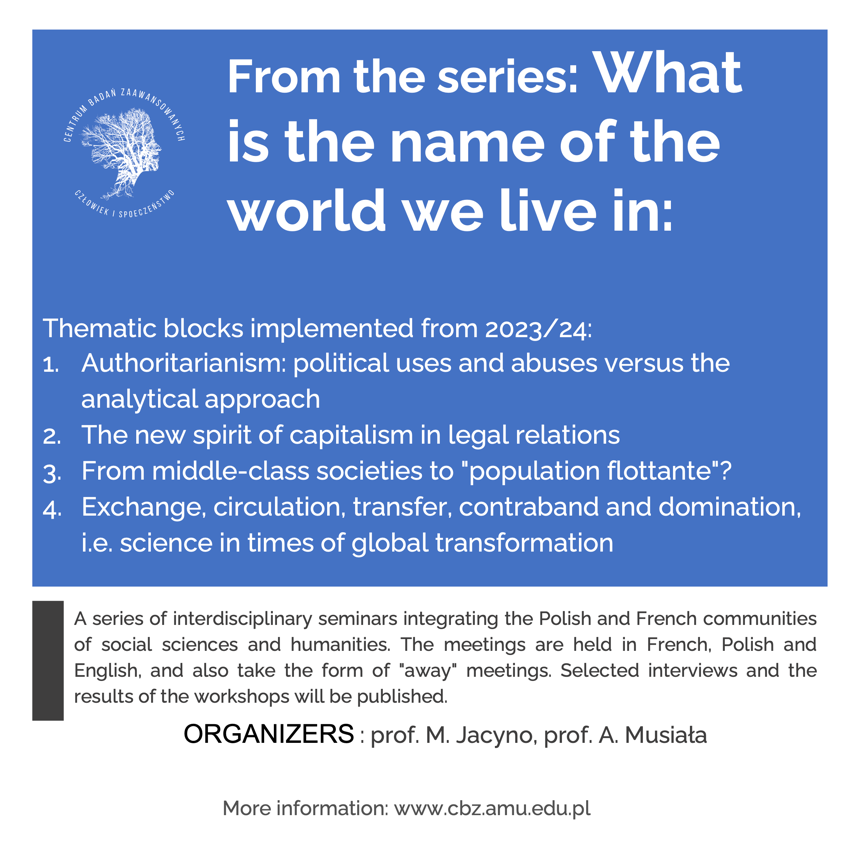
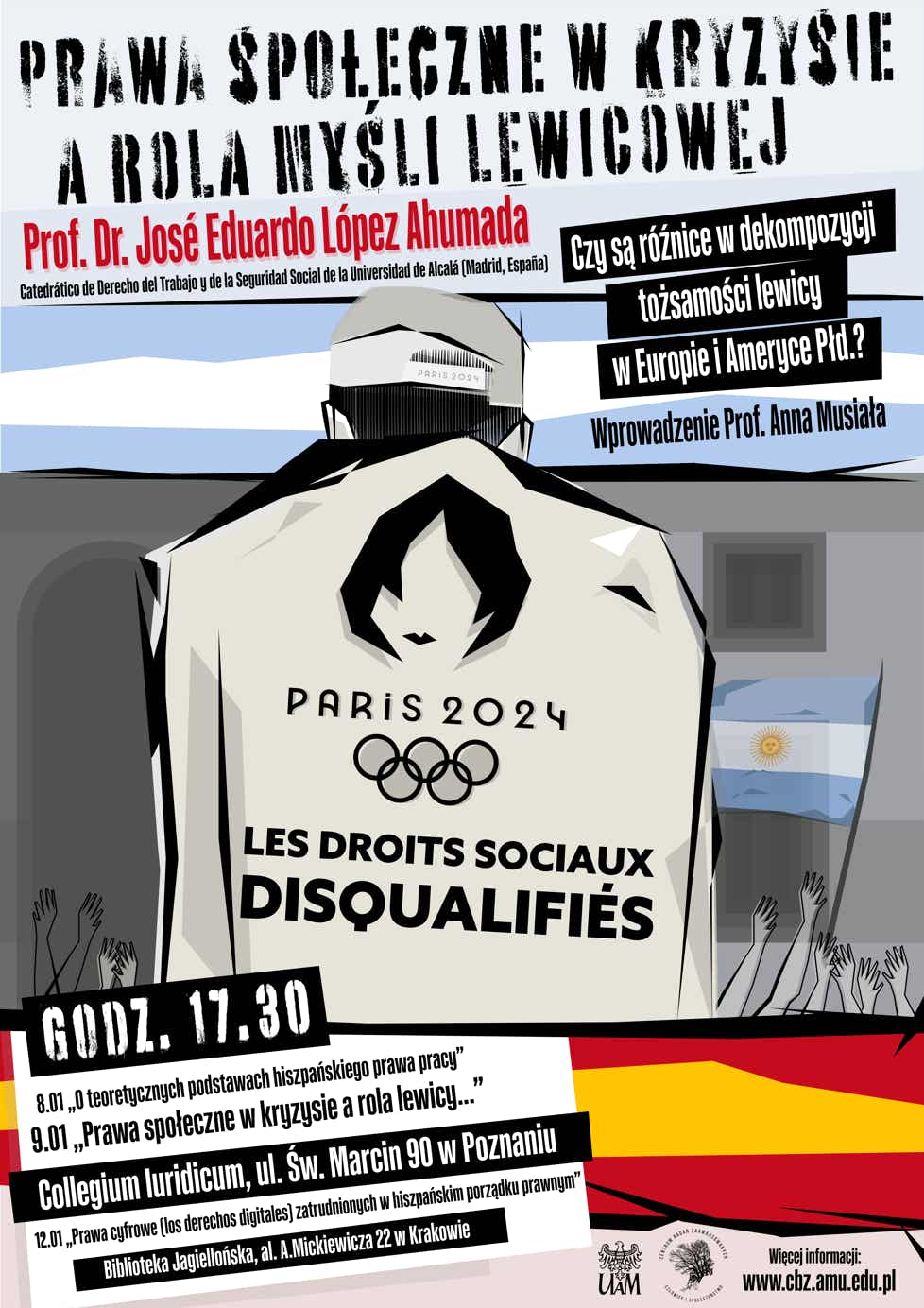
Recent publications of
prof. José Eduardo López Ahumada, are works on the digital rights of workers.
He devoted two large monographs to them, as a result of the work of the research team he led for the last few years. These works are to be an inspiration for the "Cracovia" part of the visit,
CBZ, January 5, 2024
Meeting with
Professor Andrzej Szahaj,
on the topic of "Democracy/democracy in the workplace",
in the context of the books: Andrzej Szahaj, "Kapitalizm wyczerpania" and Jacques Rancière's, "Nienawiść do demokracji"
CBZ, November 2, 2023, at 6 p.m
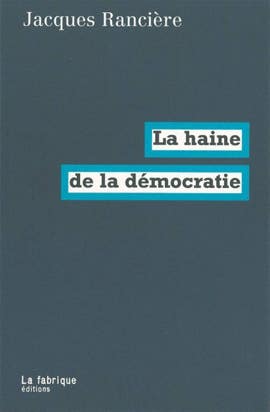
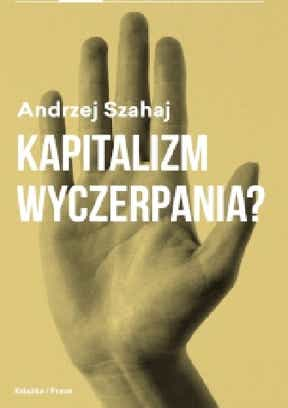
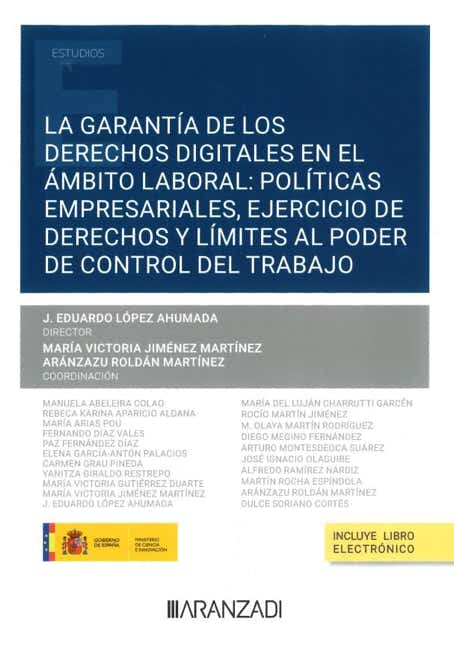
Ceremonial meeting with
Professor José Eduardo López Ahumada,
as part of the seminar entitled:
"Social rights in crisis and the role of left-wing thought: are there differences in the decomposition of the identity of the left in Europe and South America?"
Poznań, Collegium Iuridicum, room 316,
January 9, 2014, 5:30 p.m.
Anna Musiała
CBZ, January 4, 2024
*for organizational reasons, please report your willingness to participate by January 10 to the following address: musiala@amu.edu.pl
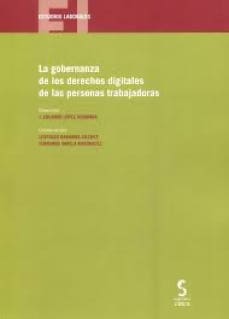
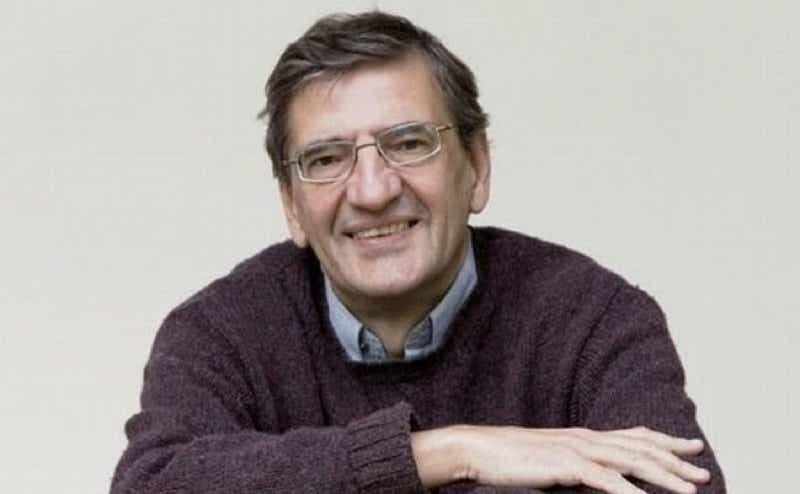
prof. Andrzej Szahaj
The second part of the long-announced meeting with
prof. David OST
around the book: "Solidarność a polityka antypolityki".
I would like to thank
Prof. David OST
for an exciting lecture, and
Prof. Małgorzata Jacyno,
Prof. Monika Kostera,
Mr. Jarema Piekutowski,
for substantive and organizational preparation.
Anna Musiała
CBZ, 11.10.2023
Lecture by Prof. Nicole Maggi-Germain,
titled :
“The participation of the international labor organization in the construction of a world labor order"
CBZ, October 16, 2023
(room 4.07, Collegium Iuridicum Novum, Poznań, 1:15 p.m.)
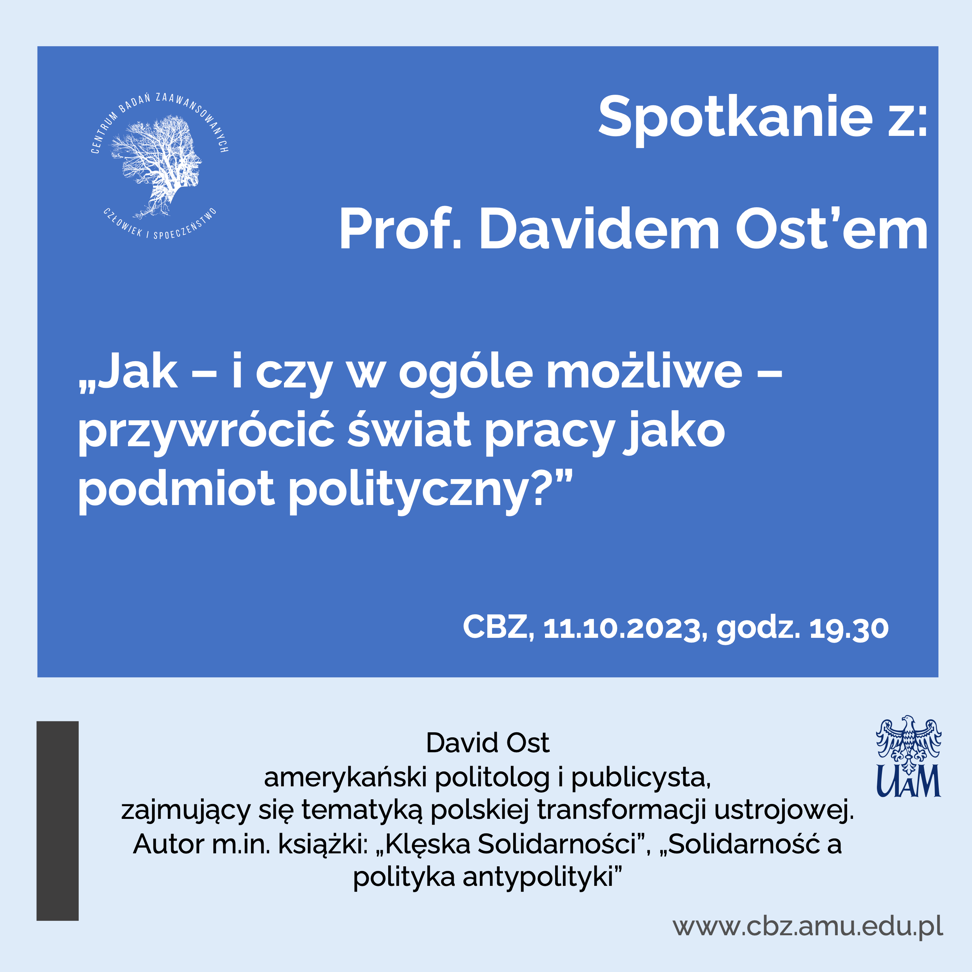
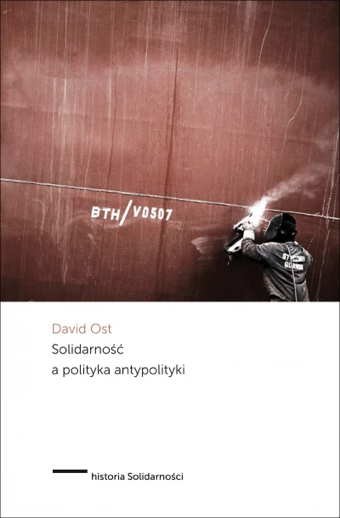
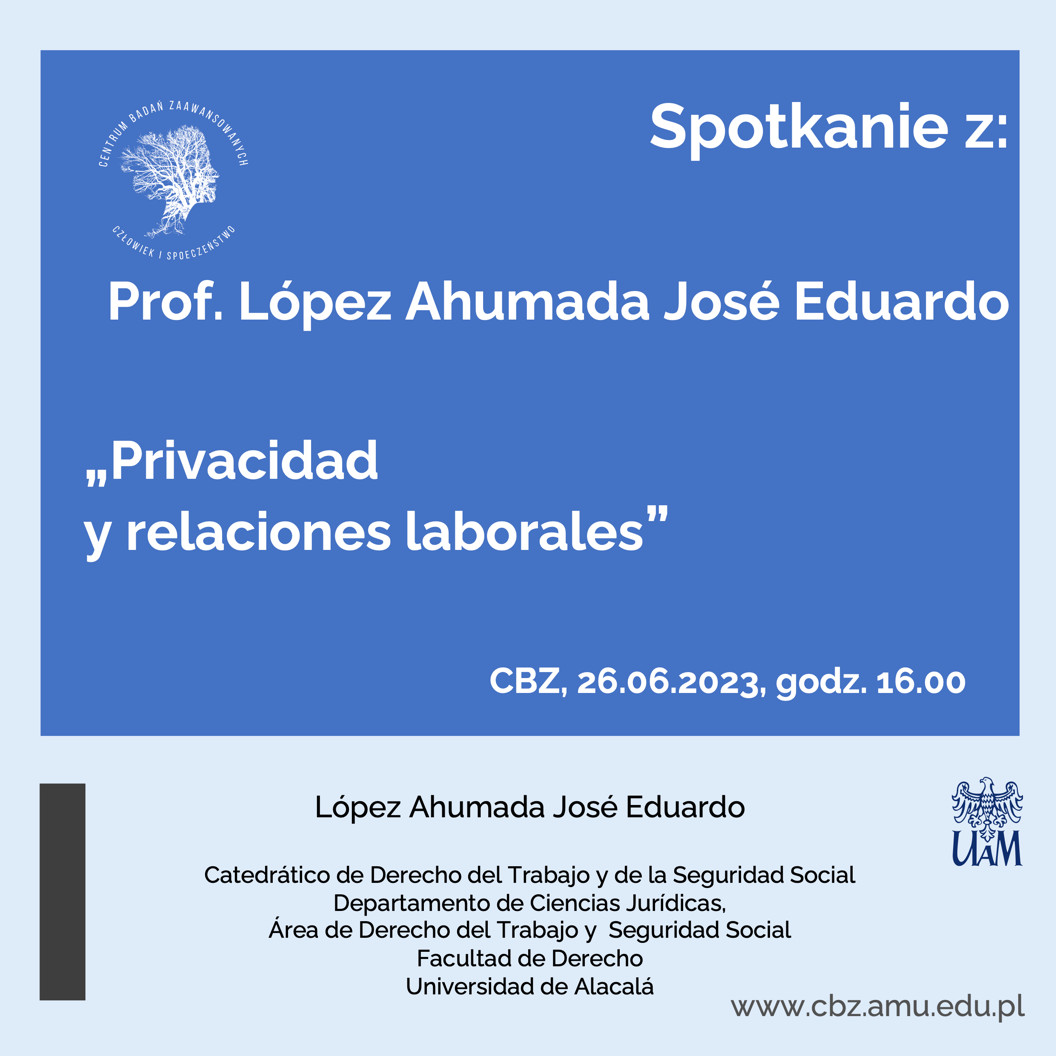
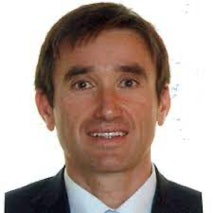
prof. López Ahumada José Eduardo
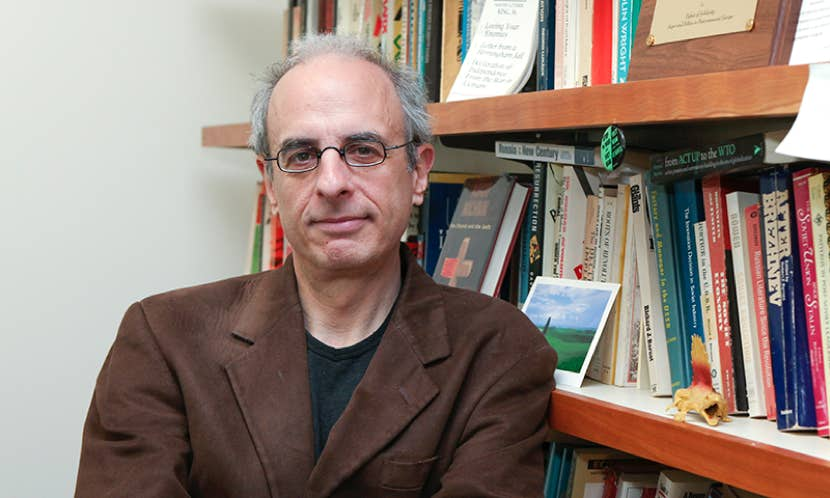
prof. David OST
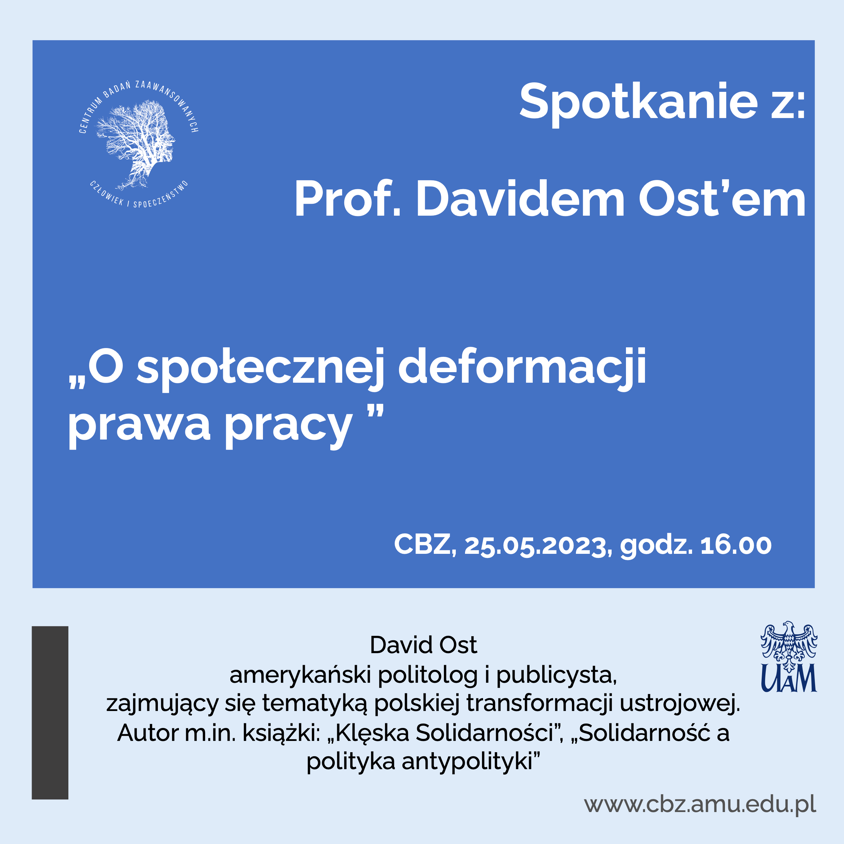
Today, together with "my" seminar students, we met with Prof. David Ost to talk about the social deformation of labor law in Poland.
Professor, thank you very much for this excellent meeting and we are already looking forward to meeting you after "the holidays".
Anna Musiała
CBZ, May 25, 2023
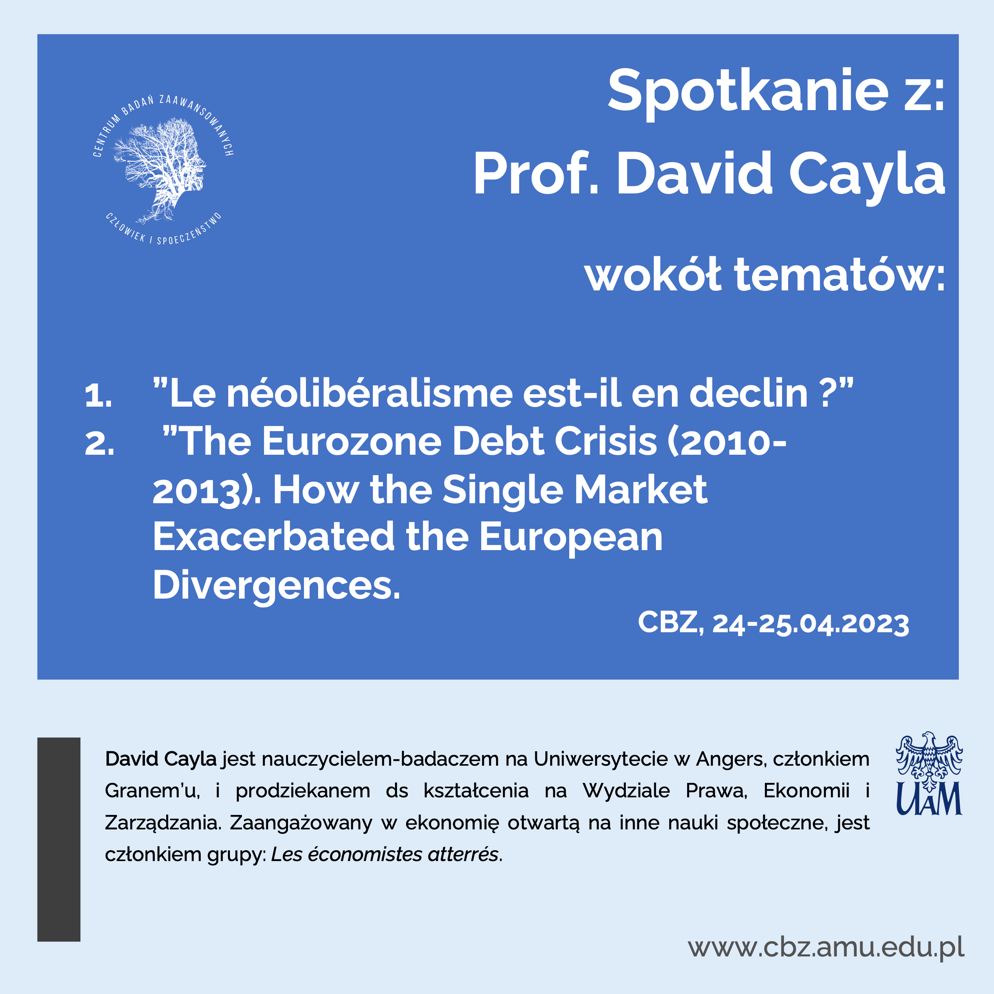
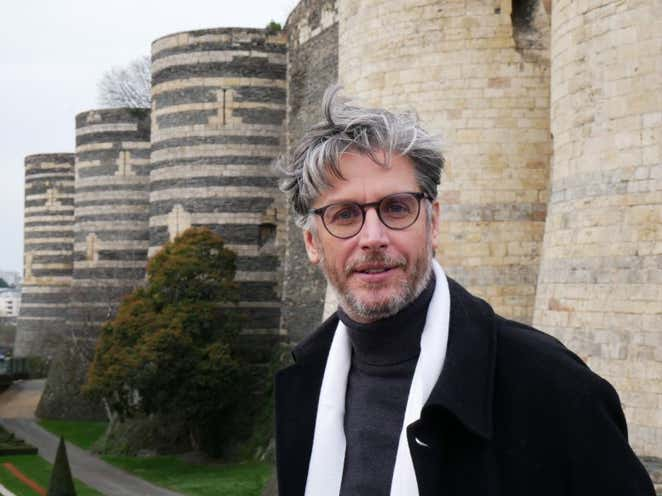
prof. David Cayla
Conférence 1: Le néolibéralisme est-il en déclin?
(24.04, godz. 16.45, Collegium Iridicum Novum, Poznań, al. Niepodległości 50, s. 2.3, tłum. na polski)
David Cayla
Economiste, chercheur au GRANEM, Université d’Angers
Depuis l’effondrement du système de Bretton Woods au début des années 1970, la plupart des pays du monde, parfois poussés par les institutions internationales, ont engagé des politiques inspirées de la doctrine néolibérale, fondée sur l’idée d’organiser le système productif, et plus globalement la société, sur le principe des prix de marché. En cela ils rompaient avec le régime de régulation des prix des biens de production qui s’était imposé au moment de l’après-guerre.
La crise financière de 2008 a cependant bouleversé les politiques économiques et monétaires. Devenues des acteurs majeurs de nouvelles de régulation à travers les politiques de «quantitative easing», les banques centrales sont intervenues massivement sur les marchés financiers et en soutien à la dépense publique. Ce retour d’une forme de régulation étatique au sein de la sphère financière marque-t-il le déclin de la doctrine néolibérale? La résurgence de l’inflation est-elle le signe d’une perte de contrôle? Ce qui est certain, c’est qu’un changement de pratiques est en train d’émerger et que les désordres croissants de l’économie mondiale et les impératifs environnementaux imposent de repenser plus globalement le rôle économique de l’État.
Conférence 2: The Eurozone Debt Crisis (2010-2013) How the Single Market Exacerbated the European Divergences
(25.04, godz. 16.00, Collegium Iridicum Novum, Poznań, al. Niepodległości 50, s. 0.1)
David Cayla
Economist, GRANEM research center, University of Angers
The real causes of the euro crisis (2010-2013) are still questioned. For the European authorities, it was mostly due to the imperfection of national institutions of the affected countries. In response, they recommend policies focused on the correction of these imperfections by demanding reforms in a move towards a balanced budget and improved competitiveness.
This presentation aims to point out the role of the Single Market in the intra-eurozone divergence process that lead to the debt crisis of the peripheral countries. We found that the Single Market has strengthened the agglomeration mechanisms (Krugman 1991), which explains the geographical industrial polarization of Europe. Although this dynamic has been beneficial for the core European countries, it accelerated the deindustrialization of southern economies. Moreover, the policies pursued since 2010 have failed to correct the economic imbalances. It then appears that only a profound reconsideration of the rules that organize the functioning of the Single Market would be likely to stop the current divergence dynamics of European economies.
Rafał JAKUBOWICZ: born in 1974 in Poznań. Graduate of the Academy of Fine Arts (Faculty of Art Education and the Faculty of Painting, Graphics and Sculpture) and the Adam Mickiewicz University in Poznań (Faculty of Modern Languages - specialization: Hebrew studies). Member of the National Trade Union Inicjatywa Pracownicza..
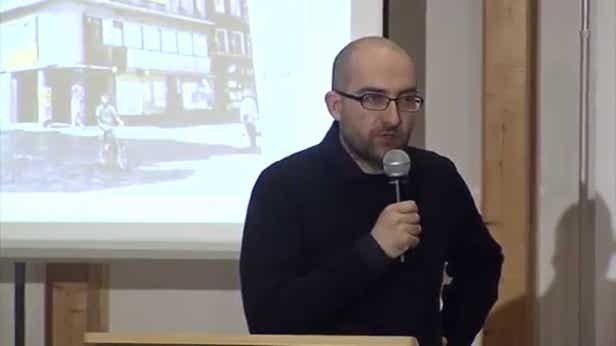
The book was published:
"Le travail n'est pas une marchandise" / "Praca nie jest towarem"
by prof. Alain Supiot, translated into Polish.
This is also the first publication of CBZ.
CBZ, 2 January 2023
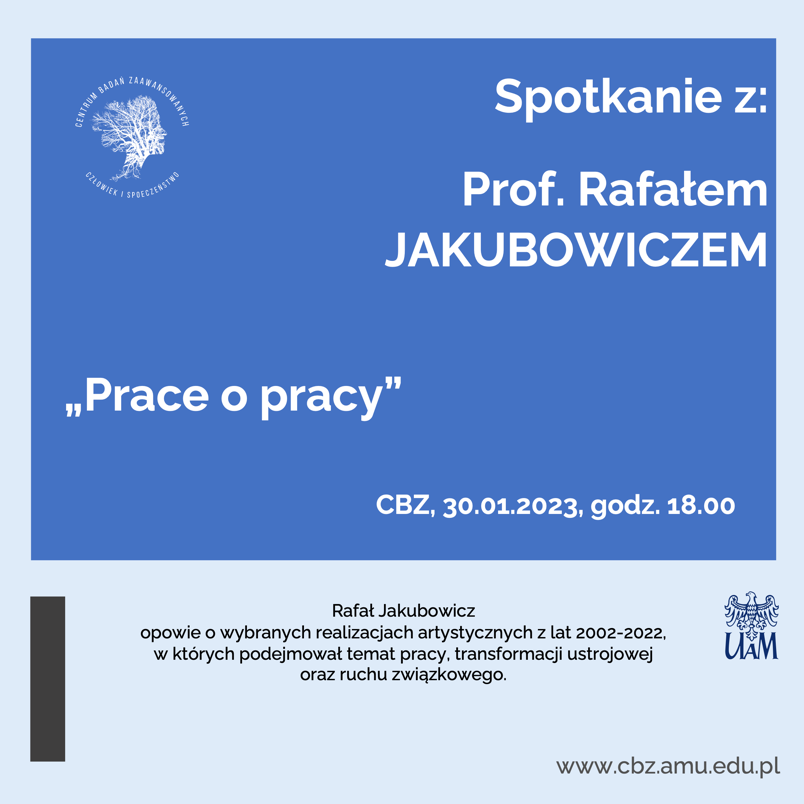
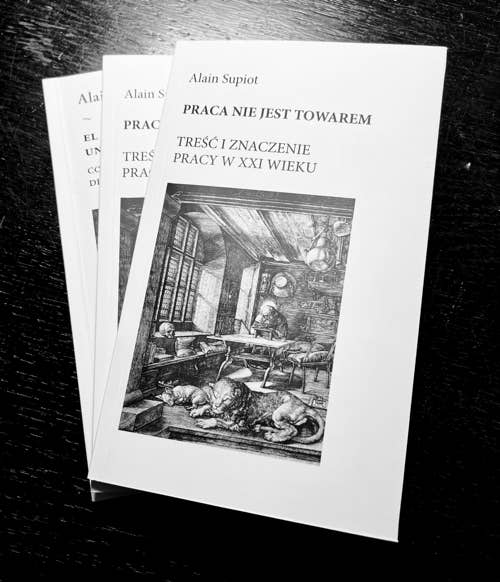
Fields of interest of prof. Rafał Jakubowicz: precariat, immaterial, reproductive, biopolitical work; autonomist Marxism (operaism and post-operaism); trade union movement; exploitation and resistance practices in special economic zones; social costs of transformation (shock therapy) in Poland and Eastern Europe; unemployment and class racism; anti-social housing policy (so-called "property restitution" and "cleaning of tenement houses"), poverty ghettos and penal management of poverty; new class struggle; gentrification (including the role artists play in it); artist as employee; factories educational towards neoliberal profitability policies; appropriation of memory in the context of historical policies; memory gentrification; ways of processing traumatic memory in contemporary art; the discourse of the Holocaust in Israeli culture and politics; Hebrew language in the art of visual, conceptual and post-conceptual artists in Israel. More:
http://www.jakubowicz.art.pl
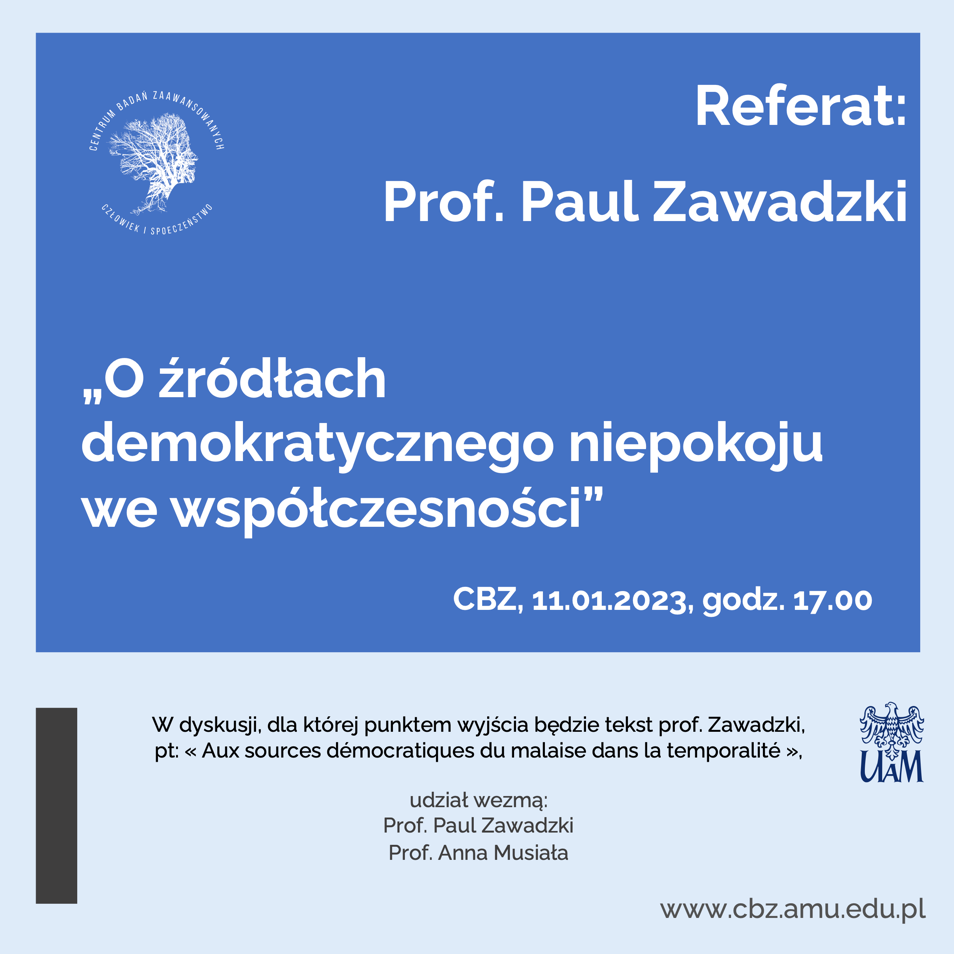
«Aux sources démocratiques du malaise dans la temporalité»,
Temporalités, n°30/2020
Prof. Paul Zawadzki teaches political philosophy and social sciences at the Faculty of Political Sciences of the University of Paris 1 Panthéon-Sorbonne. He is associated with the GSRL laboratory (Groupe sociétés religions laicités) de l'Ecole Pratique des Hautes Études, he is also a member of the L'Institut Européen Emmanuel Levinas (IIEL).
The meeting, titled:
"On the Crisis of Wage Labor in Late Capitalism",
is a continuation of the discussion about work
at the end of capitalism,
started with a discussion about a book by
Deluxe Wiesławiec:
“Every job is a disgrace. Greetings from Late Capitalism"
ed. Znak, 2022
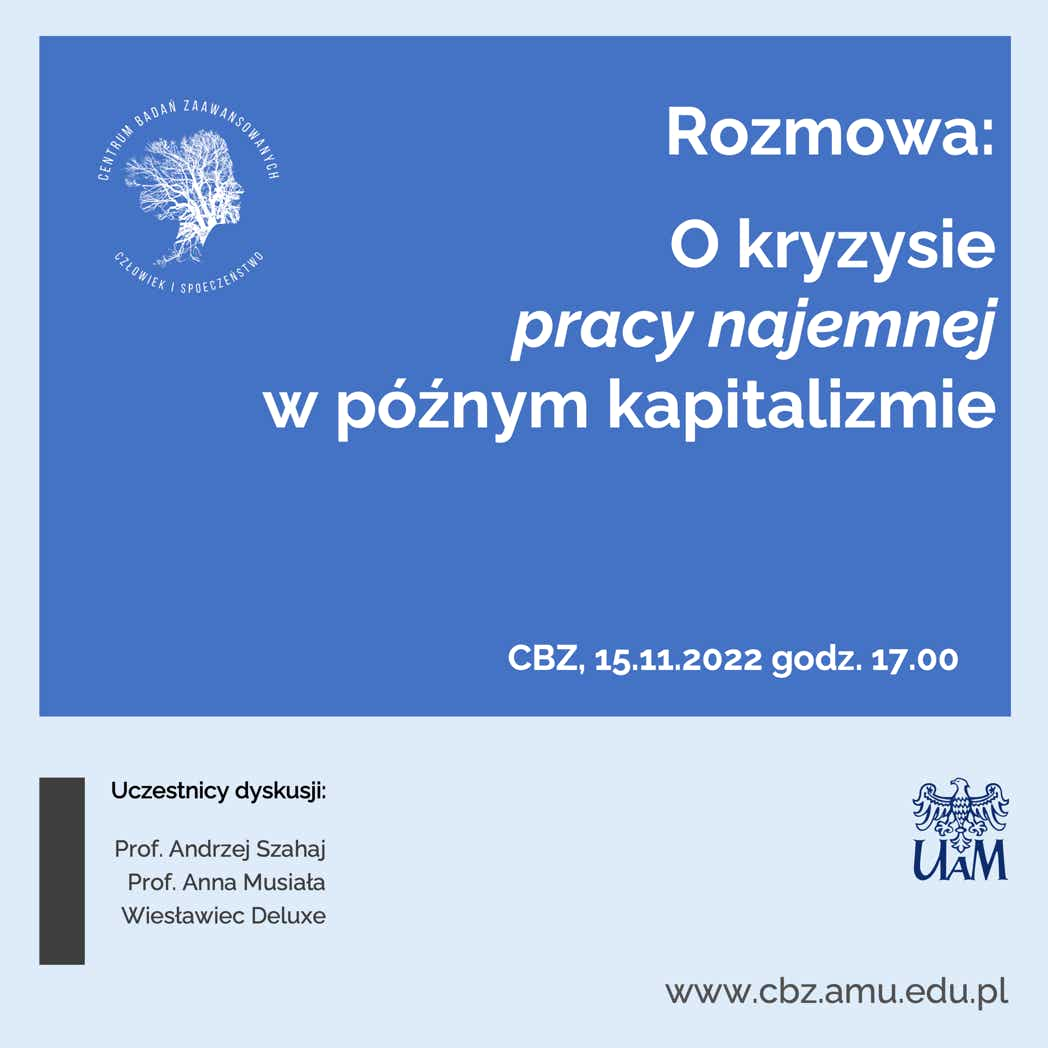
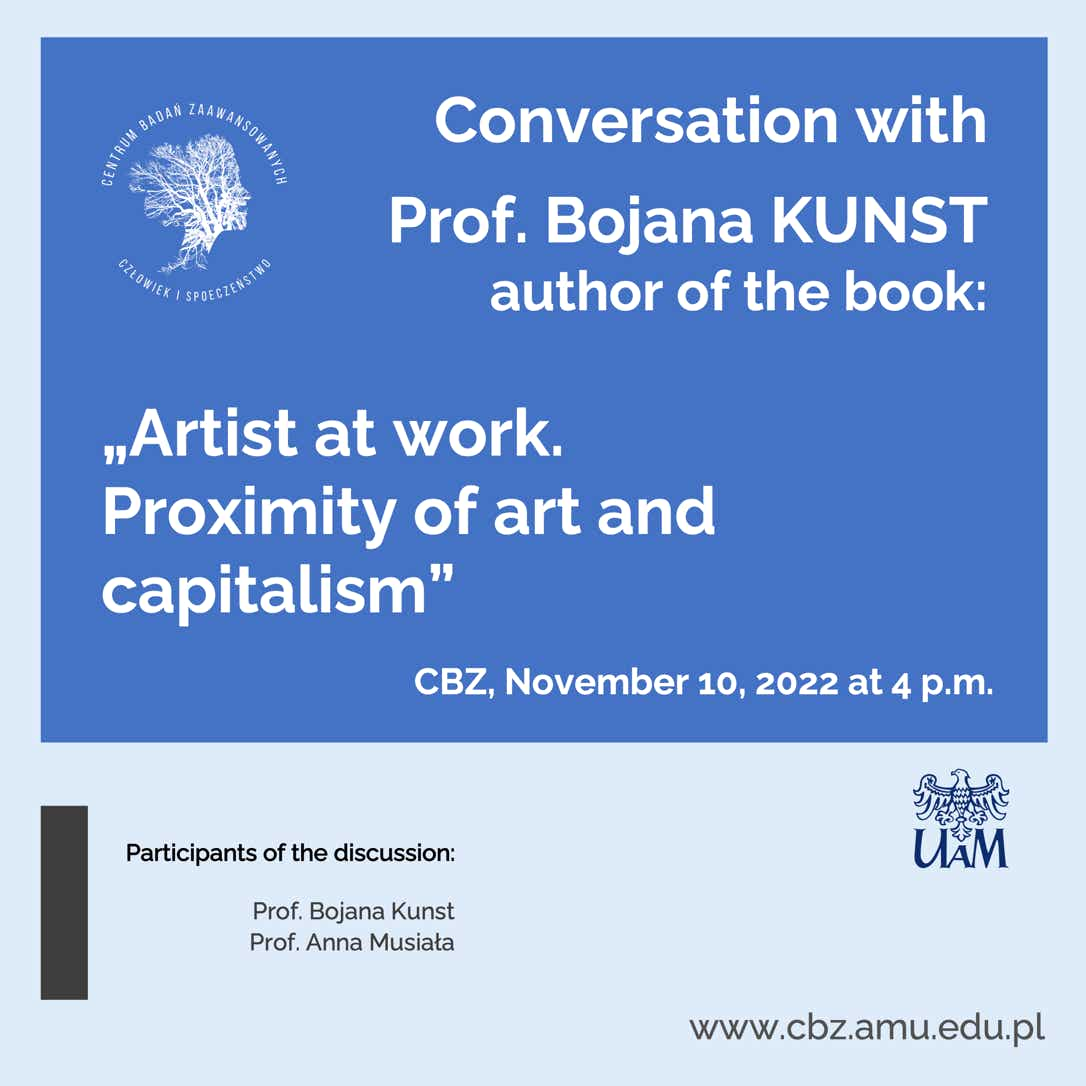
Prof. Dr. Bojana Kunst studied in Ljubljana, Slovenia, and is a full professor at the Institute for Applied Theatre Studies / ATW – Institut für Angewandte Theaterwissenschaft, Justus-Liebig University Giessen.
She is the author of the book: “Artist at work. Proximity of art and capitalism”, Washington USA 2014.
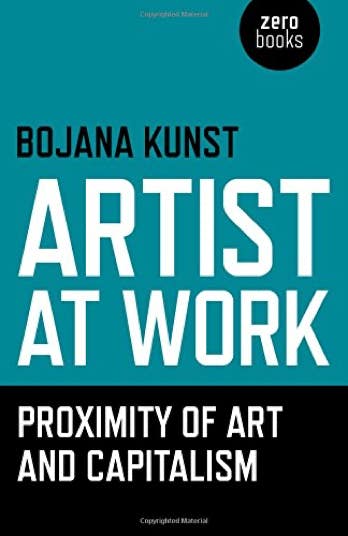
“Artist at work. Proximity of art and capitalism”.
“Artistic work is the focus of my interest because it allows us to analyse some important characteristics of the development of contemporary art in the last few decades and especially the changes in the forms of artistic autonomy that appeared with the increasing closeness of art and life. The aim of my book is therefore to note that these changes are closely connected to the changes in contemporary capitalism and the entry of post-Fordist ways of production into the centre of contemporary production.” (p. 18).
“Old forms of life become obsolete even before they can actually be absorbed. This opens up the way for subjectivity, which experiences its transformation through constant existential paradoxes. This makes us live in a constant state of tension, at the edge of anxiety; it is this state that causes an increase in our investments.” (p. 21-22). “(…) In this context, I see radical consumption as the consumption of the body, presence, human actions and abilities, physical strength, spiritual power and effects; it aims to intervene into the intersubjective and productive nature of subjectivity and, in this way, also open up the relationship between performers and spectators.” (p. 22).
“The problem is therefore that in today’s capitalism, we work in the manner that Abramović calls performance mode. One’s work is intertwined with the performing and the maintenance of creativity; in this, one should ignore every disturbance from the environment or political context, as well as any antagonist disturbance that comes from the sphere of the public. (…) This loss of voice is also quite close to the contemporary ways of working; those can also be revolutionary works without a political voice, with art and the contemporary creative work closely resembling each other in this aspect.” (p. 42-43).
“But what happens with capitalists who donate their wealth to art and receive tickets to the performances art pieces of the rich, in which they not only participate, but are also critically addressed? Their pleasure lies in the critical attitude towards them; it is in the co-existence of their status as the rich and a parodic critique of their role.” (p. 47).
“Today, these social relations are at the core of generating value, with manners of production connected to the exploitation of these relations. At the same time, the dematerialization of objects and the fetishisation of open procedures and transparent relations are at the core of post-Fordist shifts in the understanding of work and production.” (p. 59).
“The museum is still a space for production, a space for exploitation; in the <<museum as a factory>>, things are still produced.” (p. 63).
“It is also non coincidence that many venues intended for the contemporary artistic events actually inhabit former Fordist factories that there were deserted after the relocation of Fordist production to non-Western countries.” (p. 64).
“Let us ask ourselves, where this accurate description of the highly ambitious performance artist actually comes form. Is this not the description of the contemporary worker, equipped for continuous high performance? That of the always critical and active labourer, whose subjectivity in entirely subjected to the modes of contemporary capitalist production?” (p. 80).
“What, then, is the community? Paradoxically, it is the constant dispossession of collaboration and its possibilities.” (p. 96)
“(…) the communities are much more coincidental and flexible and are not connected to a certain space; they are actually not united by work, but over the very specific temporal dimension of meeting.” (p. 97).
“This intriguing connection between work and future underlines the excessive use of the world “project” in the contemporary artistic and creative professions; it is linked with a specific time dimension of work and creation, which I will term “projective temporality”. (p. 157).
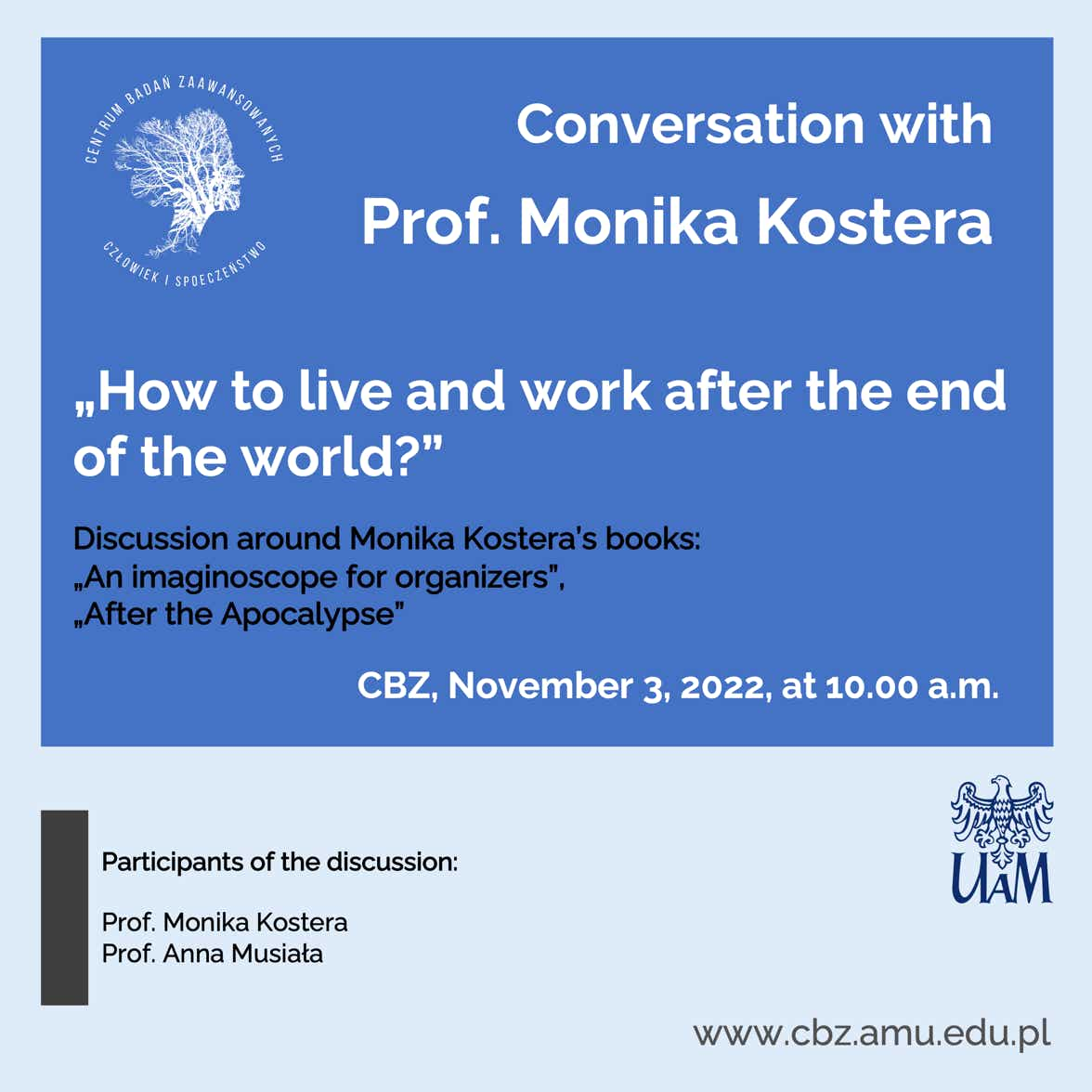
Monika Maria Kostera (born February 28, 1963 in Warsaw - Polish sociologist, titular professor of economic sciences (2004) and humanities sciences (2017), full professor at the University of Warsaw. Professor at Södertörn University in Sweden and Institut Mines Telefon Business School (Université Paris Saclay in France).
“An imaginoscope for organisers. Liminal stories for liminal times”, Washington USA 2021.
„Big social structures are dissipating and the social-economic system that embraces all the important institutions and organizations is dysfunctional. Yet there is no new working system on the horizon. (p. 2).
Neoliberalism is capitalism that has lost its memory: it is a system suffering from dementia. It is unable to learn and lacks imagination. This – at a time when we need alternatives more than ever to leave the void of the interregnum collectively and construct a new system that would be more human and ecologically sound than the former one. (p. 5).
Biology professor David Sloan Wilson (2021) expressed a strong conviction of the urgent need for stories that would reflect the human condition better than the ego- and individual-centred ones that now dominate in the public course. (p. 11). (…) But can we? How would this be possible in a tremendous crisis of imagination? (p. 11-12).
The imaginoscope is a device used to observe and experience objects and events taking place in the imagination. It is made entirely of imaginary matter. (p. 12).
The researcher is like a traveller betwixt and between known worlds, attentive and curious about everything, refraining from categorizations judgement, a light of pure consciousness immersed in the surroundings yet not quite there at all, devoid of a normal role and thus almost socially invisible. (p. 19-20).
However, we are so rarely listened to; we listen so rarely. (p. 40).
We are not able to understand management without understanding art. It is impossible to understand economic development without an aesthetic perspective (p. 114-115). (…) Social constructs, such as the market, organizing and management are all related to morality and aesthetics. (p. 115).
Our times tend to keep at hand a set of ready rapid, automatic categories for everything, which usually come in stark binary oppositions. It is always either this or the other, never and – and. Whenever a third alternatives appears and acquires a transitory status is swiftly re-categorized into one of the originals. (p. 145).
“After the Apocalypse. Finding hope in organising”, Washington USA, 2019.
We live increasingly in a world where we do not feel safe, or even at home, yet so many of us seem to think this is all that there is. As in Margaret Thatcher’s famous declaration: there is no alternative. And this is exactly what is the most dangerous of today’s many perilous tendencies. We need alternatives more than ever, and not just any alternatives but ones which give us resilient, sustainable and meaningful ways out of the interregnum and into a future worth living in. (p. 7).
The employee is a cultural construct which can be understood in a historical context, a social role central for the development of the industrial society, organized around several discipling institutions such as depersonalization of relationships, quantification as replacement for trust and reductionist rationalization. These institutions have been normalized and appear “normal” or even “inevitable” but they are neither of these things. (p. 118).
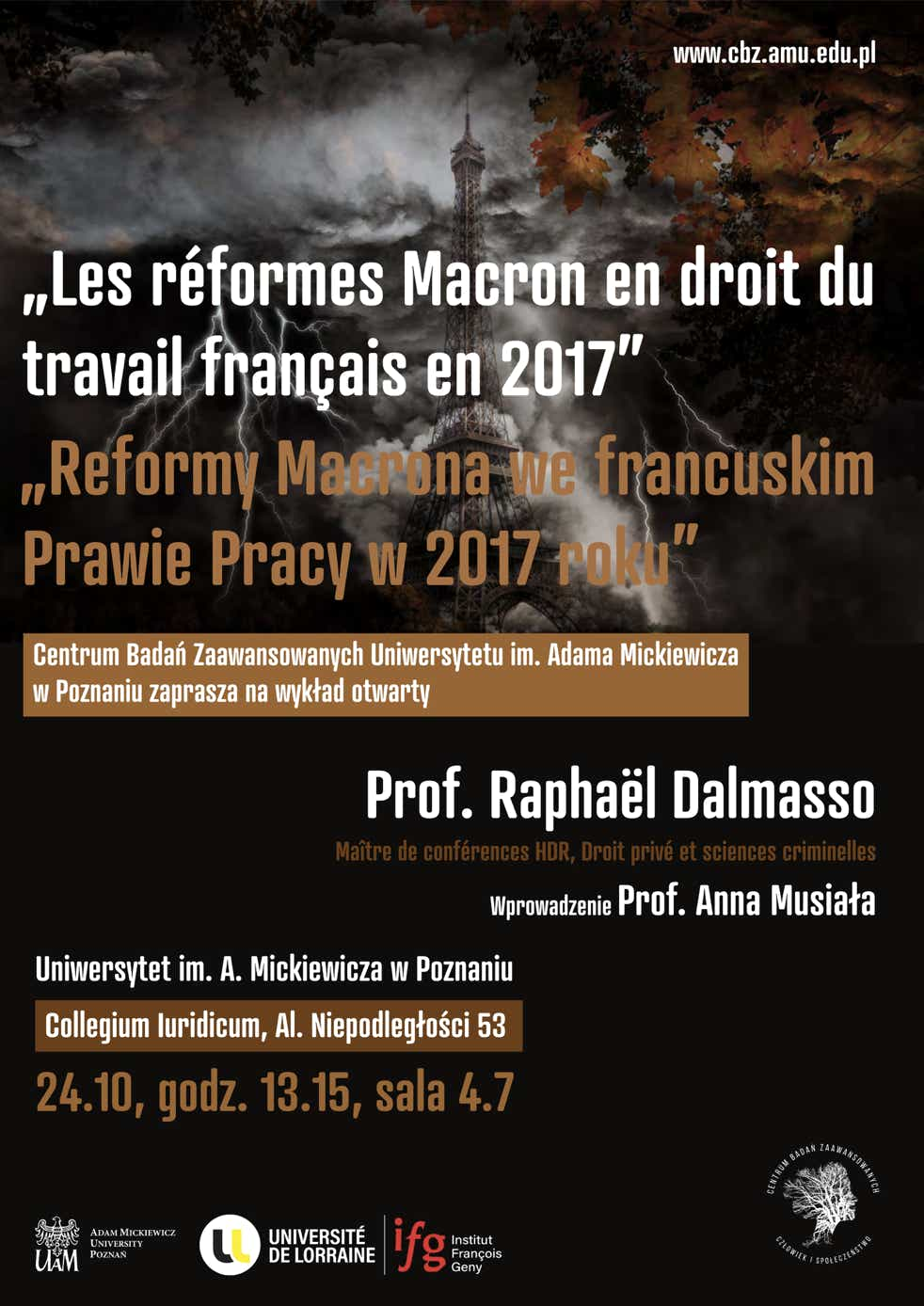
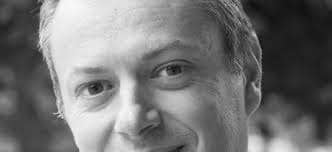
Professor Raphaël Dalmasso,
professor at the University de Lorraine, France.
Wiesławiec Deluxe, born in 1985. He graduated from international relations and sociology at the Jagiellonian University in Krakow. Former academic teacher and DAAD scholarship holder at the Vilem Flusser Archive at the University of Arts in Berlin, since 2013 employed in various corporations. Author of fan page, columns published in Ha! Artie and Going.More magazine, author of the book “Every job is a disgrace. Greetings from Late Capitalism”, published by Znak Publishing House in 2022.
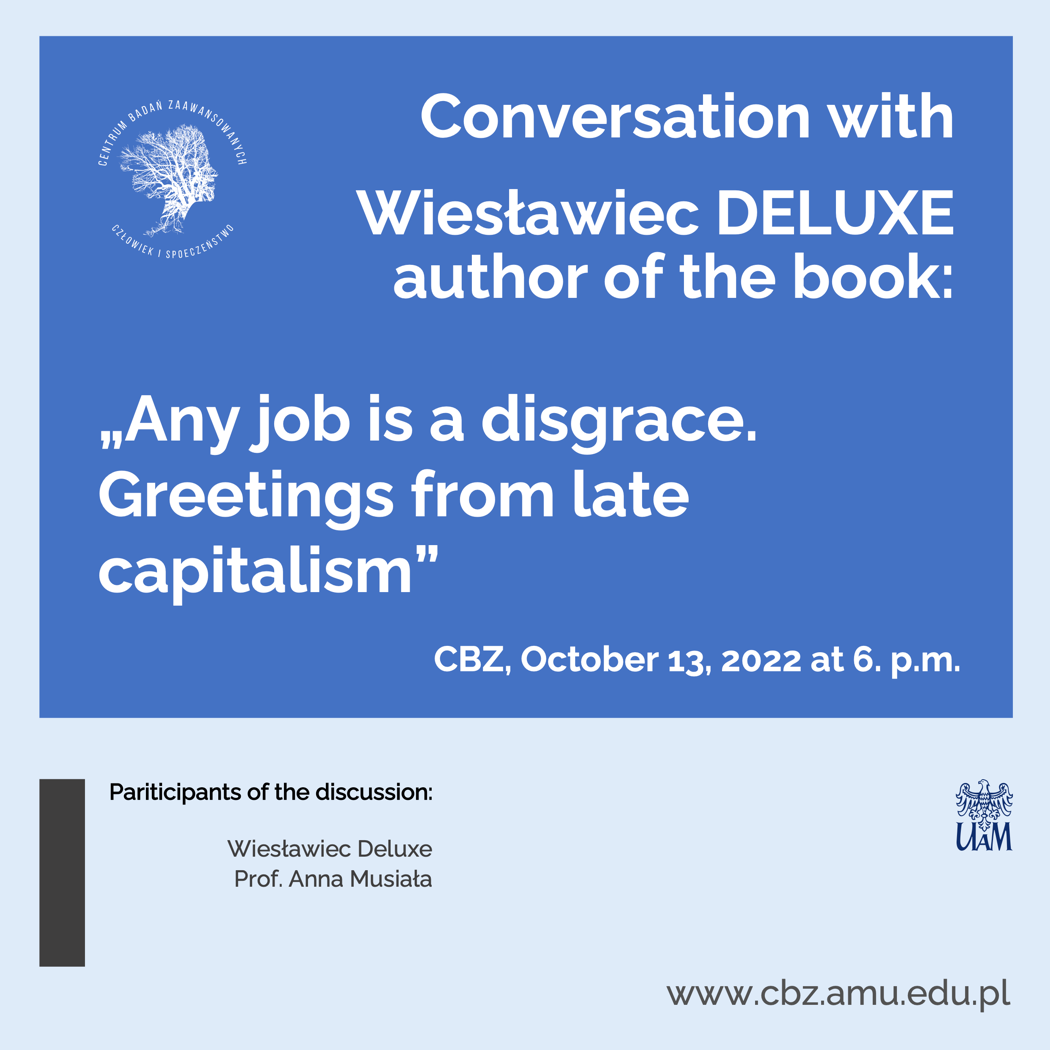
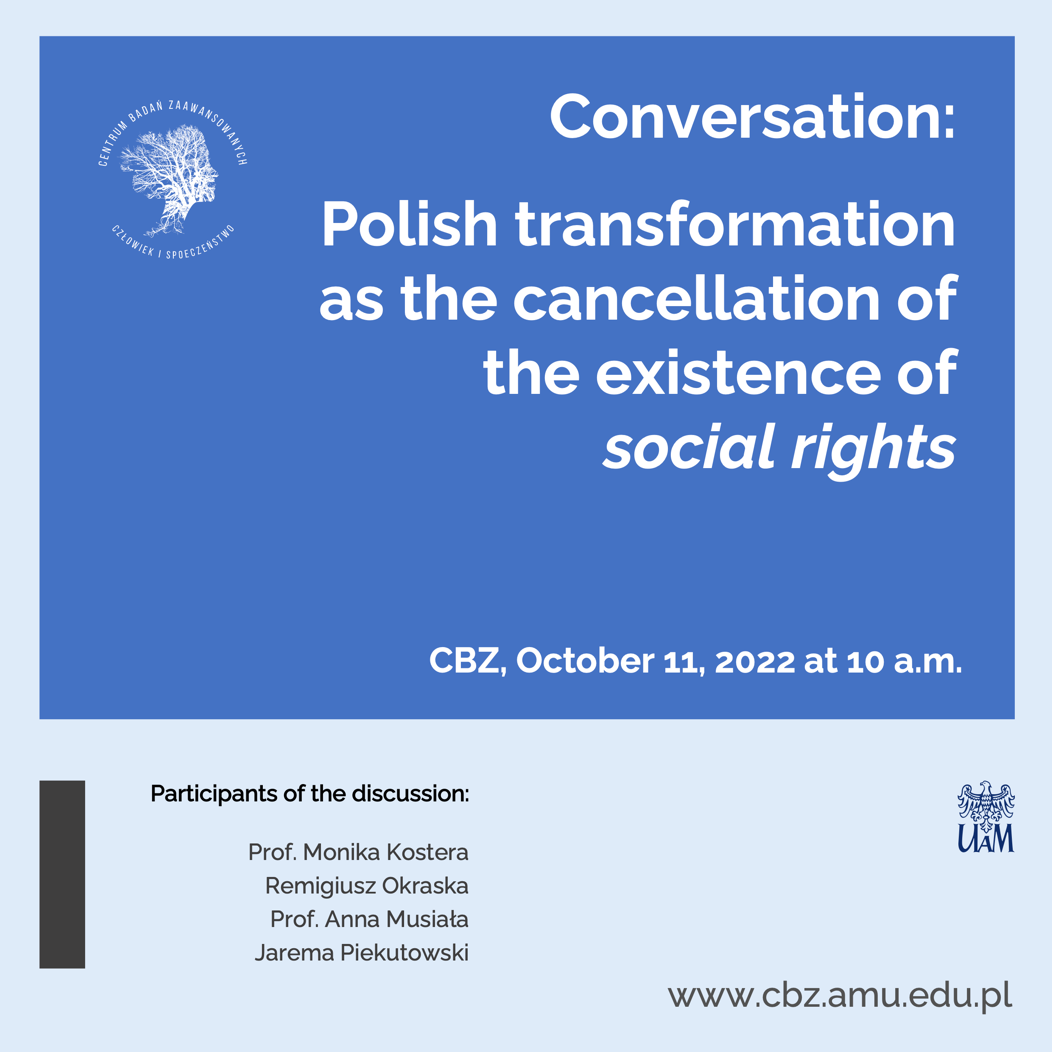
Today, we had a great opportunity to talk about the effects of transformation in terms of understanding social rights, and de facto, labor law, about the sense of returning to this - for many - trauma as unworked, about Polish society and classes that then disappeared, having such a huge impact on the modern working world.
For this wonderful conversation: Monika Kostera, Remigiusz Okraska and Jarem Piekutowski,
thank you so much.
Anna Musiała
CBZ, October 11, 2022.
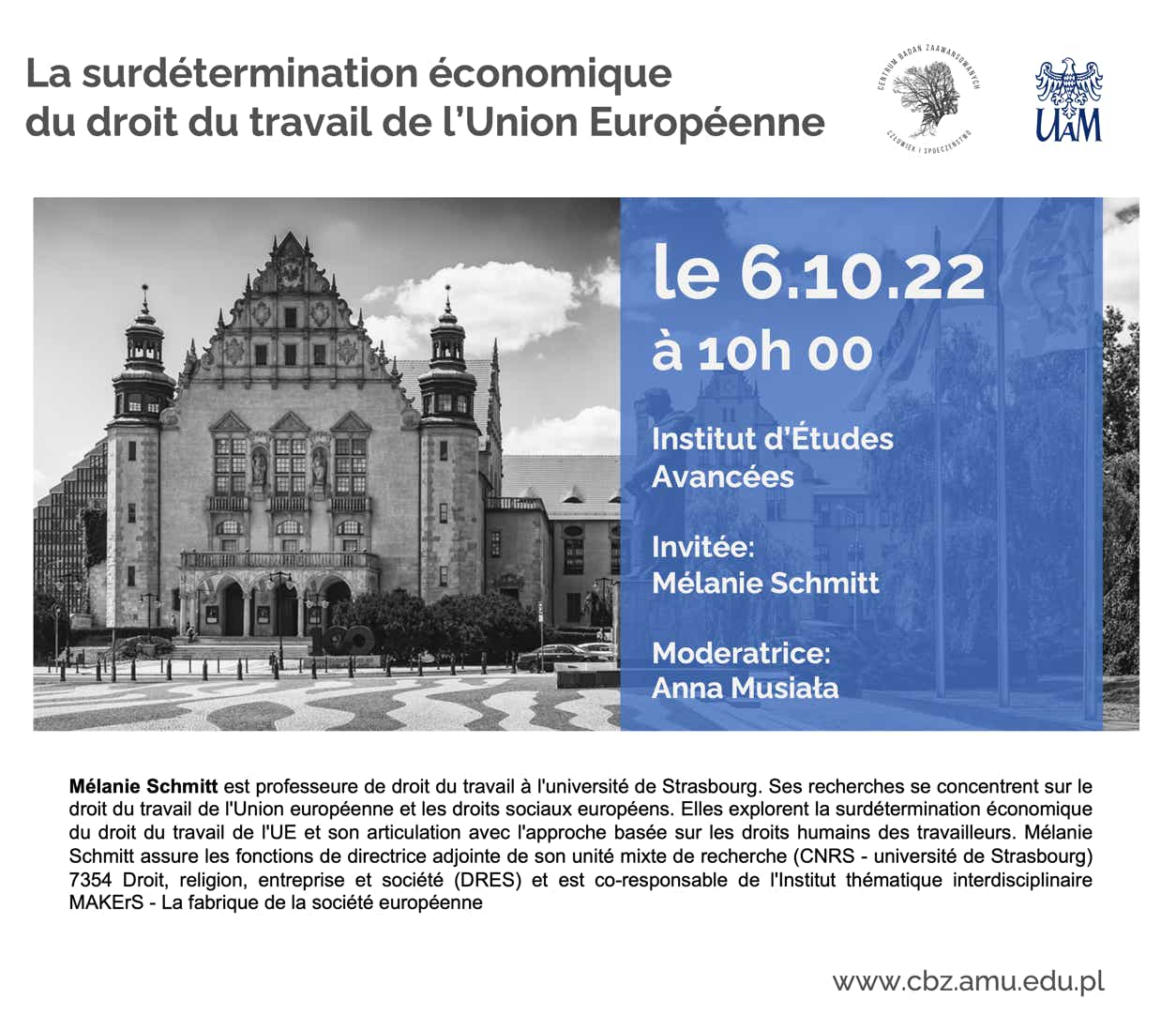
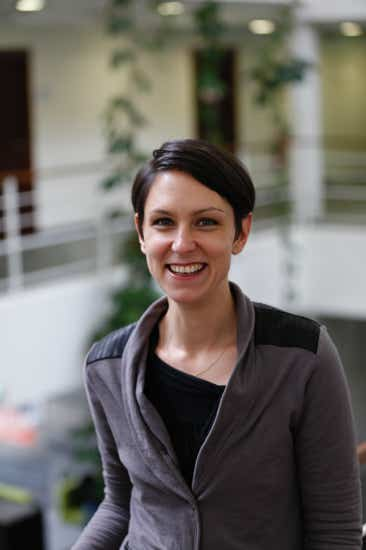
prof. Mélanie Schmitt
Conférence à l’Institut d’études avancées de l’Université de Poznan – 6 octobre 2022, 10h 00
La surdétermination économique du droit du travail de l’Union européenne
L’objet de la conférence est de questionner l’inscription du droit du travail dans le projet fondamentalement économique qu’est l’Union européenne, en vue de révéler les finalités et les fonctions de cette branche du droit.
Notre réflexion est basée sur une présentation des trois ensembles normatifs qui sédimentent et composent le «système» actuel du droit du travail de l’UE: 1) le droit du travail du marché intérieur, centré sur les libertés de circulation; 2) le droit de l’harmonisation sociale, visant la protection des travailleurs; 3) le droit du marché du travail, concourant aux objectifs de croissance et d’emploi au sein de la coordination des politiques économiques des États membres de l’UE.
À partir de deux évolutions récentes primordiales, nous proposons d’analyser le déplacement des équilibres propres à chaque ensemble et de l’articulation entre ces trois ensembles. Nous tenterons d’en tirer les enseignements pour la construction juridique de l’Europe sociale.
La première évolution résulte de jurisprudence de la Cour de justice de l’Union européenne au sujet de la directive UE n°2018/957 sur le détachement des travailleurs. Dans deux arrêts importants du 8 décembre 2020 rendus à l’occasion de recours en annulation de cette directive formés par la Pologne et par la Hongrie , la Cour rejette les arguments des gouvernements polonais et hongrois fondés sur une vision économique des règles du détachement en matière de droit du travail, et procède à une réinterprétation sociale de ces règles en introduisant le concept inédit de «concurrence équitable» dans sa jurisprudence. Désormais, la rémunération des travailleurs ne peut plus valablement constituer un élément de concurrence entre les États membres, leurs entreprises et, in fine, leurs travailleurs.
La seconde évolution résulte quant à elle de l’adoption en 2017 du Socle européen des droits sociaux et sa mise en œuvre subséquente. Conçu pour renforcer la dimension sociale de l’Union économique et monétaire, ce texte peut être analysé comme un (nouveau) programme de développement la politique d’harmonisation sociale de l’UE. Le droit du travail de l’Union européenne en ressort encastré dans la politique économique, qui lui impose ses objectifs, ses méthodes et, plus largement, sa rationalité.
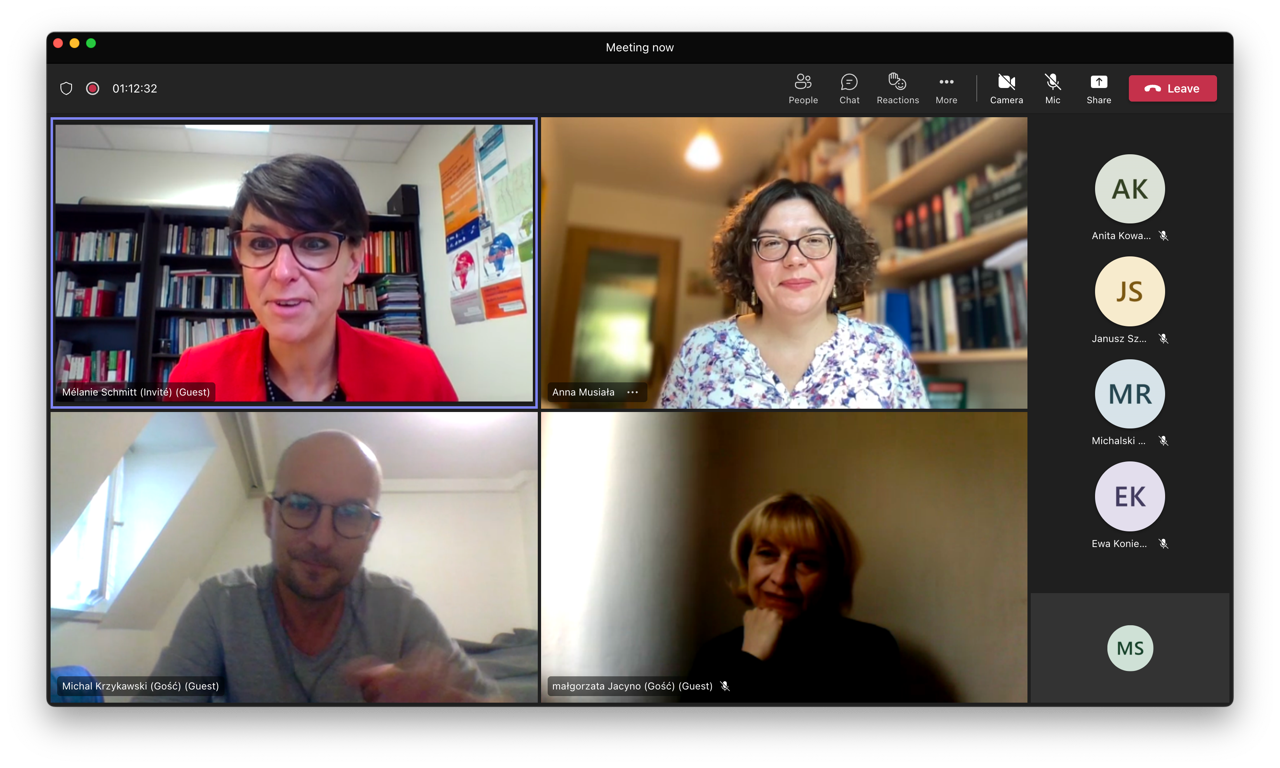
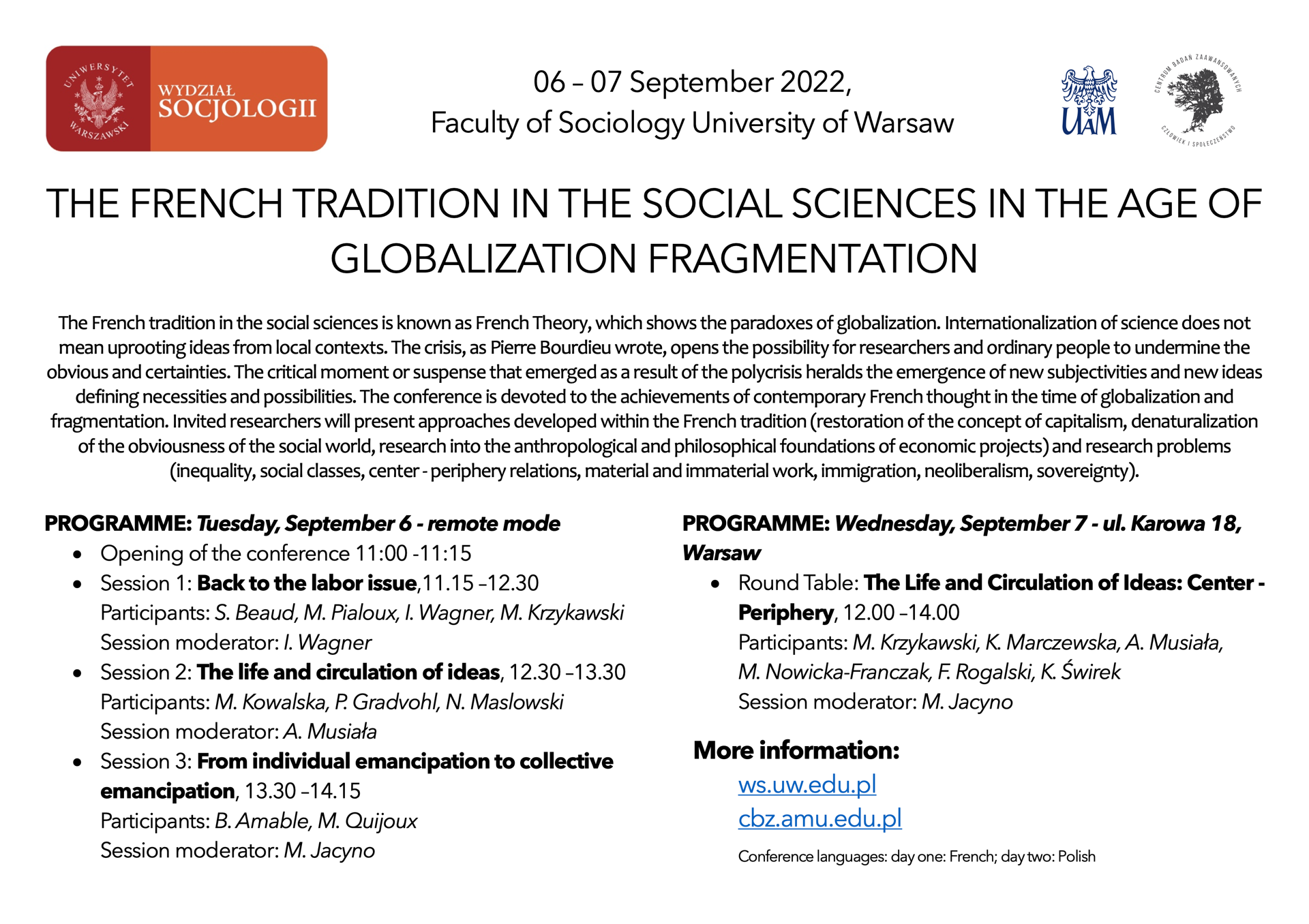
More information:
Wydział Socjologii Uniwersytetu Warszawskiego
Conference participants:
Bruno Amable, Université de Genève, Département d’histoire, économie et société
Stéphane Beaud, Institut d'études politiques de Lille
Paul Gradvohl, Centre national de la recherche scientifique
Małgorzata Jacyno, Uniwersytet Warszawski, Wydział Socjologii
Małgorzata Kowalska, Uniwersytet w Białymstoku, Instytut Filozofii
Michał Krzykawski, Uniwersytet Śląski, Centrum Badań Krytycznych nad Technologiami
Katarzyna Marczewska, tłumaczka
Nicolas Maslowski, Uniwersytet Warszawski, Centre de civilisation française
Anna Musiała, Uniwersytet im. A. Mickiewicza w Poznaniu, Centrum Badań Zaawansowanych
Michel Pialoux, École des hautes études en sciences sociales, Centre de sociologie européenne,
Magdalena Nowicka-Franczak, Uniwersytet Łódzki, Wydział Ekonomiczno-Socjologiczny
Maxime Quijoux, Centre national de la recherche scientifique, Laboratoire interdisciplinaire pour la sociologie économique
Filip Rogalski, antropolog, tłumacz
Krzysztof Świrek, Uniwersytet Warszawski, Wydział Socjologii
Izabela Wagner, Collegium Civitas